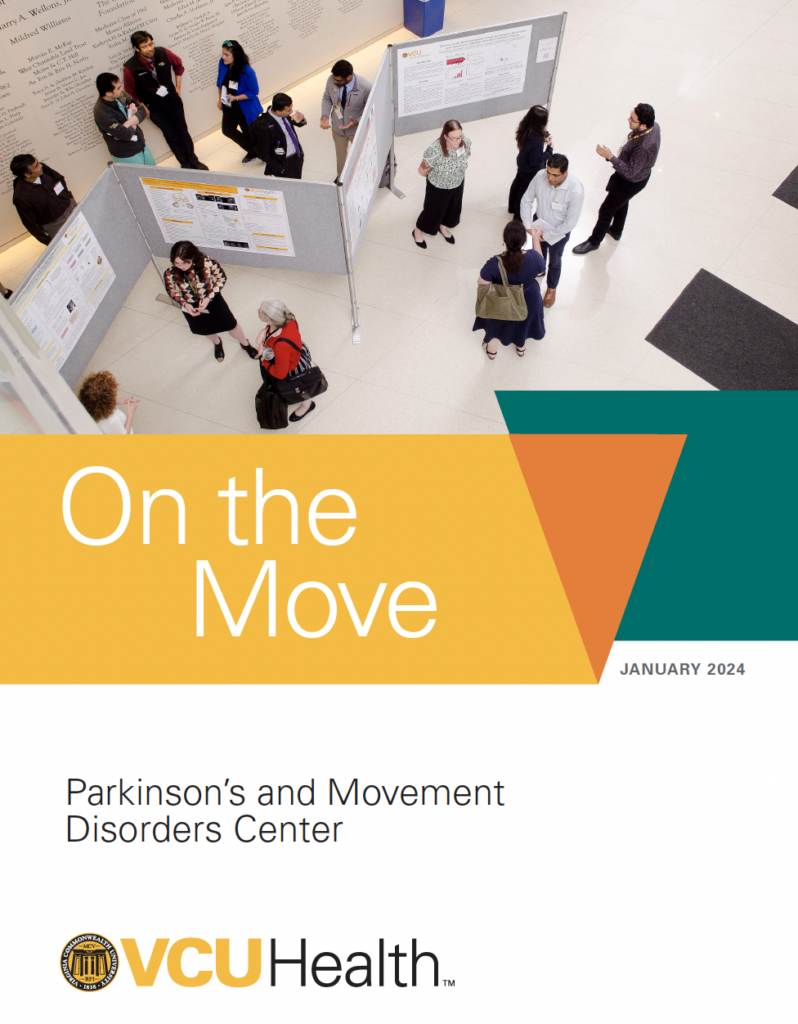Our January 2024 newsletter
View our January 2024 newsletter, looking back at the last six or so months of activity at the VCU Parkinson’s and Movement Disorders Center. Here’s a message from that newsletter from the PMDC director Brian Berman, MD, MS.
Many times when I tell others about the work we do at the Parkinson’s and Movement Disorders Center (PMDC), they hear only the first word in our name — and overlook the words “movement disorders.”
Treating and researching Parkinson’s disease is critical to our mission, but it is not the only movement disorder on which our team focuses. Every day, we work hard to provide exceptional care to individuals with other neurological disorders that affect movement, and we are further striving to make scientific advances that will bring new treatments and cures to those people living with often complicated and overlooked conditions.
The spectrum of movement disorders is broad and includes many with unique and overlapping characteristics. At the PMDC, we care for individuals with conditions that share some symptoms with Parkinson’s disease, such as Lewy body dementia (LBD), Multiple System Atrophy (MSA), Progressive Supranuclear Palsy (PSP), as well as other more distinct movement disorders including Huntington’s disease, dystonia, essential tremor, and ataxia.
Our efforts and work with these conditions are receiving national recognition. In addition to being a Parkinson Foundation Center of Excellence, CurePSP Center of Care, and a Huntington’s Disease Society of America Center of Excellence, we just became one of the first designated MSA Coalition Centers of Excellence in November. We are also pursuing becoming a Lewy Body Dementia Association Research Center of Excellence.
As you will read in this newsletter, one movement disorder we are increasing our focus on is MSA. It is a degenerative neurological disorder that can cause symptoms that mimic Parkinson’s disease and cause ataxia (loss of coordination) and is frequently associated with autonomic nervous system dysfunction — leading to blood pressure fluctuations and bladder and bowel issues that are difficult to treat.
With the addition of Cameron Miller-Patterson, M.D., to our team, we are not only expanding our research portfolio to include studies in MSA, but in 2024 he will help lead a new Autonomic Clinic designed to help diagnose and treat individuals with these often very challenging symptoms.
While our goal is to provide the highest-quality comprehensive care and carry out cutting-edge research at the PMDC, we also strive to ensure the strides
we make in diagnosis and treatment are equitable and accessible to individuals across diverse populations.
So when it comes to diversity, equity and inclusion (DEI), we do more than make statements. For example, we know there are disparities in Parkinson’s disease care based on factors such as race, ethnicity, and gender. Through DEI efforts led by Stephanie Bissonnette, D.O., M.P.H., we are evaluating beliefs and factors that influence medical decision-making in individuals with Parkinson’s disease across races and ethnicities in order to develop educational resources in the form of videos, pamphlets, or webinars that can address the needs of those diverse populations affected by disparities.
We’re also educating our faculty, residents, and students at VCU on the social determinants of health for patients with neurological disorders with a focus on health literacy and how that affects our patients’ ability to best care for themselves.
Comprehensive and equitable patient care, collaborative and impactful research, and excellence in education and training of the next generation of movement disorders providers. All of this is led by team members here at the PMDC who have a passion for their work and unceasingly aim to improve the lives of those entrusted to our care.

Brian D. Berman, MD, MS
PMDC Director and Movement Disorders
Division Chair and Professor, VCU Department of Neurology
